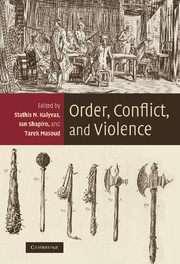Book contents
- Frontmatter
- Contents
- List of figures
- List of tables
- List of contributors
- Preface
- 1 Introduction: integrating the study of order, conflict, and violence
- Part 1 Creating, maintaining, and restoring order
- Part 2 Challenging, transforming, and destroying order
- 8 Civil wars and guerrilla warfare in the contemporary world: toward a joint theory of motivations and opportunities
- 9 Clausewitz vindicated? Economics and politics in the Colombian war
- 10 Articulating the geo-cultural logic of nationalist insurgency
- 11 Which group identities lead to most violence? Evidence from India
- 12 Order in disorder: a micro-comparative study of genocidal dynamics in Rwanda
- 13 Sexual violence during war: toward an understanding of variation
- 14 “Military necessity” and the laws of war in Imperial Germany
- 15 Preconditions of international normative change: implications for order and violence
- 16 Promises and pitfalls of an emerging research program: the microdynamics of civil war
- Index
- References
14 - “Military necessity” and the laws of war in Imperial Germany
Published online by Cambridge University Press: 06 July 2010
- Frontmatter
- Contents
- List of figures
- List of tables
- List of contributors
- Preface
- 1 Introduction: integrating the study of order, conflict, and violence
- Part 1 Creating, maintaining, and restoring order
- Part 2 Challenging, transforming, and destroying order
- 8 Civil wars and guerrilla warfare in the contemporary world: toward a joint theory of motivations and opportunities
- 9 Clausewitz vindicated? Economics and politics in the Colombian war
- 10 Articulating the geo-cultural logic of nationalist insurgency
- 11 Which group identities lead to most violence? Evidence from India
- 12 Order in disorder: a micro-comparative study of genocidal dynamics in Rwanda
- 13 Sexual violence during war: toward an understanding of variation
- 14 “Military necessity” and the laws of war in Imperial Germany
- 15 Preconditions of international normative change: implications for order and violence
- 16 Promises and pitfalls of an emerging research program: the microdynamics of civil war
- Index
- References
Summary
One of the chief ways in which states have tried to order, that is to limit, the violence of war is through law. The international law of war grew out of customary practices developed by armies as they clashed on the field. There were three great periods when these customs were codified into written law: the seventeenth century (done by individual writers, most notably Hugo Grotius), the late nineteenth/twentieth centuries (done by international conferences), and the late twentieth/twenty-first centuries (done by international conferences, judicial extension, the establishment of international courts, and of the International Court under international auspices). This essay examines the second period, when a fundamental disagreement occurred between Imperial Germany and most other Western states over whether war could be limited at all. That disagreement, which had profound effects on how war was actually prosecuted, hinged on the definition of military necessity.
The term “military necessity” is a technical phrase of international law and custom coined to describe the spheres and circumstances in which lethal force or destruction may lawfully occur in time of war. Military necessity has a long history, yet it has been surprisingly little studied. In the late nineteenth and early twentieth centuries it was especially controversial because, as nations codified custom into written law, they successively narrowed the meaning of military necessity. Imperial Germany battled against this development. It claimed wide latitude for military necessity – so wide as to cancel out law altogether, contemporary observers from other countries charged.
- Type
- Chapter
- Information
- Order, Conflict, and Violence , pp. 352 - 377Publisher: Cambridge University PressPrint publication year: 2008
References
- 5
- Cited by

